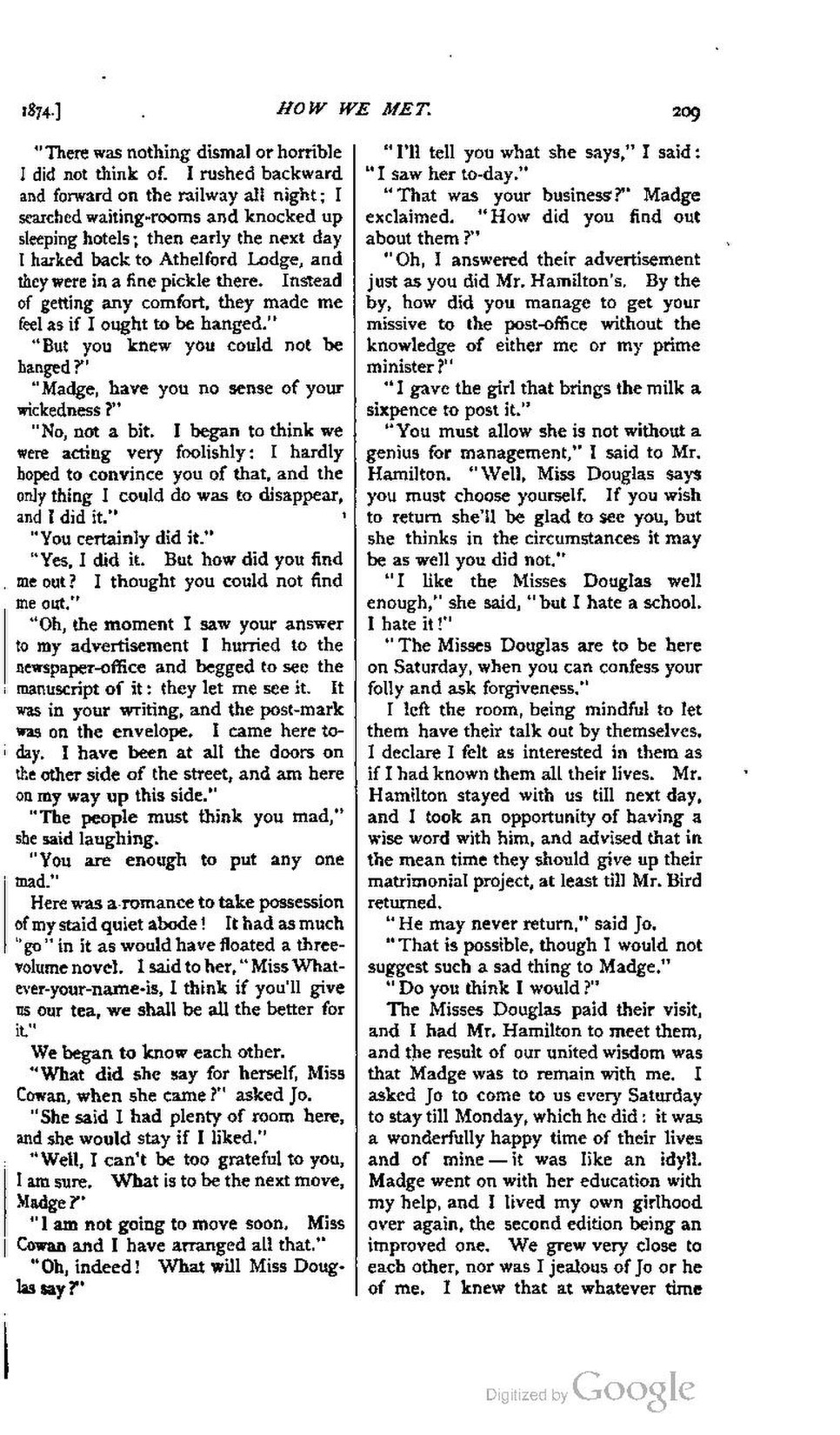"There was nothing dismal or horrible I did not think of. I rushed backward and forward on the railway all night; I searched waiting-rooms and knocked up sleeping hotels; then early the next day I harked back to Athelford Lodge, and they were in a fine pickle there. Instead of getting any comfort, they made me feel as if I ought to be hanged."
"But you knew you could not be hanged?"
"Madge, have you no sense of your wickedness?"
"No, not a bit. I began to think we were acting very foolishly: I hardly hoped to convince you of that, and the only thing I could do was to disappear, and I did it."
"You certainly did it."
"Yes, I did it. But how did you find me out? I thought you could not find me out."
"Oh, the moment I saw your answer to my advertisement I hurried to the newspaper-office and begged to see the manuscript of it: they let me see it. It was in your writing, and the post-mark was on the envelope. I came here to-day. I have been at all the doors on the other side of the street, and am here on my way up this side."
"The people must think you mad," she said laughing.
"You are enough to put any one mad."
Here was a romance to take possession of my staid quiet abode! It had as much "go" in it as would have floated a three-volume novel. I said to her, "Miss Whatever-your-name-is, I think if you'll give us our tea, we shall be all the better for it."
We began to know each other.
"What did she say for herself, Miss Cowan, when she came?" asked Jo.
"She said I had plenty of room here, and she would stay if I liked."
"Well, I can't be too grateful to you, I am sure. What is to be the next move, Madge?"
"I am not going to move soon. Miss Cowan and I have arranged all that."
"Oh, indeed! What will Miss Douglas say?"
"I'll tell you what she says," I said: "I saw her to-day."
"That was your business?" Madge exclaimed. "How did you find out about them?"
"Oh, I answered their advertisement just as you did Mr. Hamilton's. By the by, how did you manage to get your missive to the post-office without the knowledge of either me or my prime minister?"
"I gave the girl that brings the milk a sixpence to post it."
"You must allow she is not without a genius for management," I said to Mr. Hamilton. "Well, Miss Douglas says you must choose yourself. If you wish to return she'll be glad to see you, but she thinks in the circumstances it may be as well you did not."
"I like the Misses Douglas well enough," she said, "but I hate a school. I hate it!"
"The Misses Douglas are to be here on Saturday, when you can confess your folly and ask forgiveness."
I left the room, being mindful to let them have their talk out by themselves. I declare I felt as interested in them as if I had known them all their lives. Mr. Hamilton stayed with us till next day, and I took an opportunity of having a wise word with him, and advised that in the mean time they should give up their matrimonial project, at least till Mr. Bird returned.
"He may never return," said Jo.
"That is possible, though I would not suggest such a sad thing to Madge."
"Do you think I would?"
The Misses Douglas paid their visit, and I had Mr. Hamilton to meet them, and the result of our united wisdom was that Madge was to remain with me. I asked Jo to come to us every Saturday to stay till Monday, which he did: it was a wonderfully happy time of their lives and of mine—it was like an idyll. Madge went on with her education with my help, and I lived my own girlhood over again, the second edition being an improved one. We grew very close to each other, nor was I jealous of Jo or he of me. I knew that at whatever time
